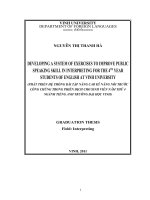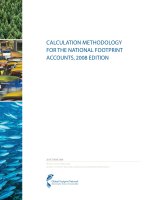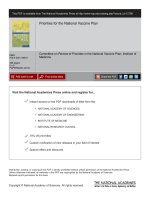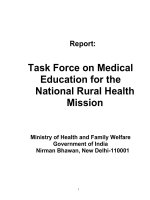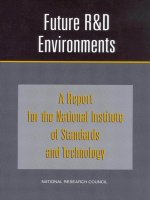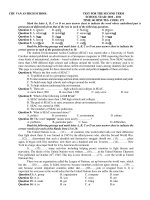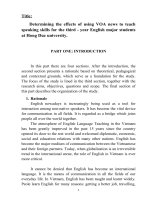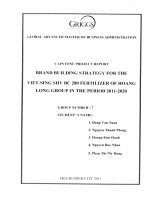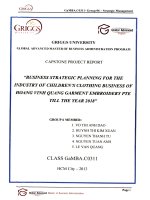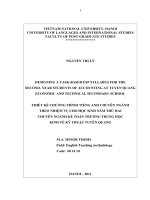APPLYING MIND MAPS IN REVISING FOR THE NATIONAL HIGH SCHOOL FINAL EXAMINATION AT NGUYEN HOANG HIGH SCHOOL IN
Bạn đang xem bản rút gọn của tài liệu. Xem và tải ngay bản đầy đủ của tài liệu tại đây (611.25 KB, 20 trang )
THANH HOA DEPARTMENT OF EDUCATION AND TRAINING
NGUYEN HOANG HIGH SCHOOL
INITIATIVE EXPERIENCE
APPLYING MIND MAPS IN REVISING FOR THE
NATIONAL HIGH - SCHOOL FINAL EXAMINATION
AT NGUYEN HOANG HIGH SCHOOL IN 2017 - 2018 PART E: LANGUAGE FOCUS OF TEXTBOOK 12.
The writer: Lâm Thị Toàn.
Position: The team leader.
Initiative experience:in the field of English
THANH HOA - 5/ 2018.
1
TABLE OF CONTENTS:
St
1
2
3
4
5
6
7
8
9
10
11
12
13
14
15
16
17
18
19
Section
The cover
TABLE OF CONTENTS:
Acknowledge
PART I: INTRODUCTION
1 . Reasons for choosing the topic
2. The scope and purpose of the research topic
3. The object of study:
4. Research Methodology
5. The new of the initiative experience.
PART II: SOLVING PROBLEMS
1. The problem's rationales:
2. Status of the research problem:
3. Performance measures:
4. Sample design:
5. Results of applying the initiative experience in learning:
PART III : CONCLUSIONS AND RECOMMENDATIONS.
1. Conclusions :
2. Recommendations:
PART IV: REFERENCE DOCUMENTS :
DANH MỤC: Các đề tài Sáng kiến kinh nghiệm đã được hội
đồng đánh giá xếp loại cấp Sở GD&ĐT và các cấp cao hơn xếp
loại từ C trở lên.
Trang
1
2
3
3
3
4
4
4
4
5
5
6
6
9
18
18
18
19
19
20
2
ACKNOWLEDGE
To learn more clearly about reviewing for students’ national high - school final
examination in 2018, I have chosen this topic. During the studying process, I have
read a lot of documents and consulted my colleagues about this matter. However, I
can't avoid making mistakes in the essay. I would like to show my gratitude for
sharing their ideas and feedback for my research to be completed.
TOPIC:
APPLYING MIND MAPS IN REVISING FOR THE NATIONAL HIGH SCHOOL FINAL EXAMINATION AT NGUYEN HOANG HIGH SCHOOL
IN 2018 - PART E: LANGUAGE FOCUS OF TEXTBOOK 12.
PART I: INTRODUCTION
1 . Reasons for choosing the topic :
Foreign languages have a special meaning for Vietnamese students in the
context of cooperation relations and international integration. Currently, the main
foreign language, which students learn in schools is English.
As a result, what is the quality of teaching and learning foreign languages in
school like? This issue seems not to be clearly mentioned in the mass media.
learning, foreign language today is very considerable.
When asking questions: Do you like foreign languages? How is your result
and qualification? ... The result is quite unexpected. Over 80 percentage of students
are not interested and discouraged. The most of them sincerely admit that the level
of foreign language learning is often below average. At the end of the last semester,
teachers are easy to remark, which helps students pass. In fact, the results of the
final exams, or entrance exams, foreign language's scores are always very low, 40%
students can get average marks.
“ How I can stimulate interest in my students’ learning English and how can
we improve their result examinations?” Those are my great question.
How many steps does students’ learning consist of ? According to me, there
are four basic steps: Reading – Writing – Memorizing – Revising.
Students have to learn and they have to take exams. Obviously, many
examinees are so worried about the national high school final examination in 2018.
The more they learn, the less time they have. The more they learn, the more they
forget. To help my students overcome this difficulty, I decide to choose the topic:
“APPLYING MIND MAPS IN REVISING FOR THE NATIONAL HIGH SCHOOL FINAL EXAMINATION AT NGUYEN HOANG HIGH SCHOOL
IN 2018 - PART E: LANGUAGE FOCUS OF TEXTBOOK 12.”
Our wonderful minds are fond of color, beauty, happiness and liveliness. May
the boring words to meet those? The more excited the minds, the more information
they obtain, the longer the information keeps in the minds, which result in the
reviewing gets more interested and easier. Whoever can use this method easily.
They only need papers, colors pens and the minds. The hard - working will be
replaced by a smart method. Learners will have more free time to relax and they
will gain more better achievements.
3
In short, the mind maps make students review Part E – Language focus of
Textbook 12 more efficient to cope with the national high – school final
examination in 2018.
Hopefully, through this topic, I will receive honest feedback from colleagues to
teaching quality and quality assessment language proficiency of students will be
enhanced.
2. The scope and purpose of the research topic:
2. 1. The purpose:
It’s terrified to know that if learners don’t know how to review effectively
and they may forget about 80 percentage of what they have learned.
Mind maps are very too friendly to our minds. They help us to think,
imagine, memorize, plan and classify information. They are miraculous instruments
that help you to review effectively.
What are mind maps?
- They are simple instruments to help you to acquire, memorize and apply
knowledge.
- They are the ways to learn, remember and revise quickly, practically and
effectively.
- They make notes more interested, vivid and quickly.
- They are wonderful methods to help students organize ideas.
In summary, the mind maps lead students to concentrate on the both focus
and relative details.
2. 2. The scope of the study:
Mind maps for kids – Tony Buzan.
Objects block 12 students.
Duration of the school year 2017 - 2018.
3. The object of study:
The topic study how to found a mind map in language focus lessons and its
efficiency.
4. Method of the study:
4. 1. Theoretical research:
Reading and studying materials on the mind maps.
Reading and studying the lessons in grade 12 textbook of basic system.
4. 2. Research Practice:
Performing the language focus’s mind maps in the text book 12.
Assessment of learning behaviors and results of student assignments.
5. The new of the initiative experience:
Students used to learn English by heart, to practice English the knowledge.
They didn’t use to review their knowledge by using mind maps. I wish this topic
would help them to learn more sharply and effectively.
4
PART II: CONTENTS:
1. The problem's rationales:
How can you arrange a large mount of knowledge in logicality and
simpleness? It is impossible to memorize something in the first reading. Striking
colors and vivid images of mind maps may help our brains remember more easily.
According to Tony Buzan, there are sevens steps to set up a mind map, which helps
studying obtain good results in the examinations.
The first step, you take a paper without lines because lines will limit your
ideas. Landscape the paper. Start your idea in the middle of the paper to develop it
freely.
The second step, you prepare crayons. It is better to choose your favorite
colors.
The third step, you think of the mind map’s topic. Let you draw a simple
image to illustrate the topic. The topic is in the middle of the mind map not only to
help you focus on what you want to show but also to make room for giving ideas
comfortably.
The fourth step, you choose crayons and draw major brands coming from the
central image. The first ideas relates to the topic, so the lines is bolder. The main
ideas are written on these lines in short words, capital letters and different colors.
The fifth step, from the major ideas ( the first ideas level), let your brains to
develop detail ideas ( the second ideas level). The brands come from the major
ideas are thin and enclose small illustration pictures written on. The details are
written in lowercases and along the lines. They are linked to the main ideas, which
helps you understand better and remember longer.
The sixth step, You should deploy more detail ideas ( the third ideas level),
which make the second ideas levels more clearly and specific. The brands also
come from the second ideas are thinner and enclose small illustration pictures
written on.
The last step, you have had a wonderful tool helping memorize the lesson
better – all knowledge is only on one paper with images and colors.
Shortly, mind maps are arrangement of knowledge in the levels.
Sample 1:
5
2. Status of the research problem:
As we know, teaching English at high schools has changed greatly both
contents and methods to suit for the modern time.
The most basic educational methods is to promote students' initiative and
create good conditions for practicing themselves, so teachers need to have certain
skills and qualifications. To ensure that students not only use English well they but
also develop listening, speaking, reading and writing skills, teaching grammar and
language knowledge is very necessary.
According to English education, communication trends are difficult to apply
to a class sizes and too crowded today. When teaching a new curriculum (System 7
years) there is a lot of communication activities are omitted or teach the way of
each teacher accordingly. The effectiveness of the practice hours communicate
almost very little. In addition to, applying educational methods art as mentioned
above, a lesson to be successful there must depend on very much external factors,
including facilities, equipment, and qualified students are the key elements
Version. For this, teachers must first understand the standard knowledge - skills ,
testing and assessment methods of the course. In addition, teachers must
understand the characteristics of learners see what they lack in order to achieve the
objectives of the course.
Nowadays, although many teachers teaching foreign languages trend to
apply new methods in teaching grammar, how do they teach English effectively?
That question is still being discussed. Most teachers find it very important to teach
students grammar efficiently, which helps students to have general grammar and to
handle them in doing exercises. When students learn English, almost they have a
lot of difficulties to do exercise. Understanding grammar knowledge well
contributes to raise results’ examinations due to grammar knowledge makes up a
great rate. Moreover, if they learn grammar well, their listening, reading, speaking
and writing skills are perfected.
Several grammatical teaching methods used to be handled well such as :
introducing images and situations , giving examples, structures and rules, making
sentences…. However, those methods are still limited. Each grammar lesson are
time – consuming, learners need much time to write down and then they are
difficult to review and handle. They learning grammar, structures and usages by
heart mechanically, that ‘s why they always feel bored. Teachers should help
learners to promote their learning skills so that they review grammar. To gain good
results in the national high – school final examination in 2018, I think mind maps
are very useful tools.
3. Performance measures:
The mind maps are not beautiful and perfect pictures. They are formed
with scrawls.
Students should be encouraged to draw their own ideas with pliable curves in
order that mind maps are memorable. Each brand should have one key word or one
picture, which is easier to link new ideas. Students had better compare their
6
partners’ mind maps to check theoretical points and complete the mind maps. This
activity not only corrects mistakes themselves but also strengthens their knowledge.
Teachers should encourage students to add pictures and colors to enrich mind maps.
Finally, while some students are being talked on their own mind maps, the teacher
and the rest of students are listening, discussing, supplying, correcting and
completing them. The result of forming a mind map is to consolidate the language
focus.
There are some basic types of mind maps.
Sample 2:
Sample 3:
7
Sample 4:
Sample 5:
8
Sample 6:
4. Sample design:
This is the sample for using mind maps to review the grammar part.
DATE OF PREPARING: 01/ 11/ 2017
Unit 5: HIGHER EDUCATION
Period 33: Language focus
Time: 45 minutes
Class
Date of teaching Absent students notes
12C2
03/ 11/ 2017
1
12C5
05/ 11/ 2017
0
12C6
04/ 11/ 2017
2
I. Objectives:
1. Educational aim:
- Students know how to pronounce and mark the stress in words more than three
syllables.
- Students learn about conditional sentences.
2. Knowledge:
- General knowledge: Students learn some information to fill in a form
- New words: Words related to a form
3. Skills:
- Pronunciation: Stress in words more than three - syllable.
- Grammar: Conditional sentences
II. Method: Integrated, mainly communicative
III. Teaching aids: Text books, colour chalks .........
9
Teacher’s activities
Warm-up: (3 minutes)
Students’ activities
I. Pronunciation: (7 minutes)
II. Grammar: Review conditional sentences(14
minutes)
- Conditional sentences are used to speculate about
what could happen, what might have happened and
what we wish would happen.
- In English, most sentences using the conditional
contain the word “if”.
- Many conditional forms in English are used in
sentences that include verbs in one of the past tenses.
This usage is referred to as “ the unreal past” because
we use a past tense but we are not actually referring to
something that happened in the past.
- There are five main ways of constructing conditional
sentences in English. In all cases, these sentences are
made up of an if – clause and a main – clause. In many
negative conditional sentences, there is an equivalent
sentence construction using “unless” instead of “if”.
THE ZERO CONDITIONAL
- Reviewing the zero conditional:
? - Asking Ss to review the usage and structures.
* The usage:
- The zero conditional is used for when the time being
referred to is now or always and the situation is real
and possible.
- The zero conditional is often used to refer to general
truths.
- The tense in both parts of the sentence is the simple
present.
- In zero conditional sentences, the word "if" can
usually be replaced by the word "when" without
changing the meaning.
* The structure:
If clause
Main clause
If + simple present
simple present
If this thing happens
that thing happens.
If you heat ice
it melts.
If it rains
the grass gets wet.
? - Asking Ss to make sentences with the structures.
- Giving remarks.
TYPE 1 CONDITIONAL
- Reviewing conditional sentence type I:
? - Asking Ss to review the usage and structures.
- Listening,
responding and
writing down.
- Listening,
responding and
writing down about
the usage and
structures:
- Making sentences
with the structures:
+ If you freeze
water, it becomes a
solid.
+ Plants die if they
don't get enough
water.
- Listening,
responding and
10
Sample 7: The small parts of the mind maps:
* The usage:
TYPE 2 CONDITIONAL
* The usage:
* The structure:
* Examples:
THE ZERO
CONDITIONAL
* The usage:
* Examples
CONDITIONAL SENTENCES
TYPE 3 CONDITIONAL
* The usage:
* The structure:
* The structure:
* The structure:
* Examples:
TYPE 1 CONDITIONAL
* The usage:
* Examples:
MIXED TYPE
CONDITIONAL
* The structure:
* Examples:
- used for when the time being referred to is now or always and the situation is real and possible.
- refer to general truths.
* The usage:
The tense in both parts of the sentence is the simple present.
- the word "if" can usually be replaced by the word "when" without changing the meaning.
If clause, Main clause
* The structure:
If + simple present,simple present
- used to refer to the present or future where the situation is real.
THE ZERO CONDITIONAL
* The usage:
+ If you freeze water, it becomes a solid.
- refers to a possible condition and its probable result.
+ Plants die if they don't get enough water.
* Examples
If clause, Main clause
+ If it rains, the grass gets wet.
* The structure:
TYPE 1 CONDITIONAL
If + simple present, simple future
+ If I have time, I'll finish that letter.
+ What will you do if you miss the plane?
* Examples:
11
+ If it rains today, you will get wet.
- refer to a time that is now or any time, and a situation that is unreal. These sentences are not based on fact.
* The usage:
- refer a hypothetical condition and its probable result.
If clause, Main clause
* The structure:
If + simple past, present conditional or
present continuous conditional
TYPE 2 CONDITIONAL
- refer to a time that is in the past and a situation that is contrary to reality. The facts they are based on are the opposite of what is expressed.
* The usage:
- refer to an unreal past condition and its probable result in the past.
+ If I were taller, I would buy this dress.
If clause, Main clause
* Examples:
+ If I were a plant, I would love the rain.
* The structure:
If + past perfect, perfect conditional or
perfect continuous conditional
+ If it rained, you would get wet.
TYPE 3 CONDITIONAL
+ If I had known you were coming, I would have baked a cake.
* Examples:
+ I would have been happy if you had called me on my birthday.
12
+ If you had studied harder, you would have passed the exam.
- refer to a time that is in the past, and a situation that is ongoing into the present. The facts they are based on are the opposite of what is ex
* The usage:
- refer to an unreal past condition and its probable result in the present.
If clause, Main clause
* The structure:
If + past perfect or simple past, present conditional or
perfect conditional
MIXED TYPE CONDITIONAL
+ If I had studied, I would have my driving license.
* Examples:
+ If you had spent all your money, you wouldn't buy this jacket.
+ If you weren't afraid of spiders, you would have picked it up and put it outside.
Sample 8: The whole mind map:
13
5. Results of applying the initiative experience in learning:
14
By applying mind maps in revising the Language focus of Text book 12, I
found remarkably effective . Academic quality of students has increased
significantly . Weak student has decreased.
The survey results before and after applying are:
Survey results before applying are:
class size excellent
Very good
fair
poor
note
amou rate amou rate amou rate amou rate
nt
nt
nt
nt
12C2 35 1
2,9 12
34,3 17
48,5 5
14,3
12C5 42 0
4
9,5 24
57,2 14
33,3
12C6 44 0
7
15,9 24
54,5 13
29,6
Survey results after applying 12C2 and 12C6 classes are:
class size excellent
Very good
fair
poor
note
amou rate amou rate amou rate amou rate
nt
nt
nt
nt
12C2 35 5
14,3 17
48,5 12
34,3 0
12C5 42 0
4
9,5 24
57,2 14
33,3
12C6 44 7
15,9 24
54,5 11
25,5 2
4,5
Looking at the table, we can see the results: before using “APPLYING
MIND MAPS IN REVISING FOR THE NATIONAL HIGH - SCHOOL
FINAL EXAMINATION AT NGUYEN HOANG HIGH SCHOOL IN 2017 PART E: LANGUAGE FOCUS OF TEXTBOOK 12.”
EVALUATION ENGLISH , quality survey in classes are relatively equivalence.
After having applied, there are quality differentiation between students markedly
applied this method and the rest do not apply. Thus , applying mind maps has
significant advantages.
PART III : CONCLUSIONS AND RECOMMENDATIONS
1. Conclusions:
Applying this initiative experience helps me to gain some positive results.
Firstly, this initiative experience is very suitable for the programs in the new
textbook. My students are interested in learning English, they have positive
attitudes towards consolidating their knowledge.
Secondly, my students become more flexible in digesting knowledge and
promoting their learning skills. Studying gets more excited and smoothly.
Thirdly, to gain good efficiency in lessons, my students have to learn actively
and I also must be more patient.
Finally, my students have opportunities to affirm their standard, they are
confident in lessons.
Consequently, after the school year had passed, my students achieved
satisfactory results.
In summary, the education ministry should focus on innovating content,
teaching methods, testing and evaluating the quality of education as well as
15
implementing projects and schemes of innovative teaching methods. guiding and
attracting high school students to study science and technology, organizing many
kinds of intellectual playgrounds for students.
2. Recommendations:
Although the new textbooks introduce the main idea of the reconstruction
program courses, presentation skills and knowledge standards for each grade and
subject, suggests the need for methods and means of teaching learning, assessment
of learning outcomes of the course the students, but to ensure the system can adjust
and inherent requirement in the completion of development, general education
content. As in each lesson, the lesson topics and grammatical structure should be
more closely linked and unified from Reading to the Language Focus section.
Education and Training Department should open classes to enhance the depth
and promptly and update the knowledge for teachers.
Innovation examinations should pay attention to the following points:
+ The examined knowledge should be focused on the curriculum.
+ The national high – school final examinations should be planned stably in a long
term.
PART IV: REFERENCE DOCUMENTS :
During the research process, I have used the following references:
1. English textbook 12 High School English (Education Publishing House)
2. Teacher’s English book 12.
3. Document of mind maps written by Tony Buzan.
4. Pictures on the internet.
The confirmation of the head master.
Thanh Hoa, May 7th 2018
I assure this is my initiative experience,
not copying the contents of other
people's.
The author
Lâm Thị Toàn
DANH MỤC
16
CÁC ĐỀ TÀI SÁNG KIẾN KINH NGHIỆM ĐÃ ĐƯỢC HỘI ĐỒNG ĐÁNH
GIÁ XẾP LOẠI CẤP SỞ GD&ĐT VÀ CÁC CẤP CAO HƠN XẾP LOẠI TỪ
C TRỞ LÊN
Họ và tên tác giả: LÂM THỊ TỒN
Chức vụ và đơn vị cơng tác: tổ trưởng chuyên môn tổ Ngoại ngữ - Thể dục – Quốc
phòng.
Kết quả
Cấp đánh
đánh giá Năm học
giá xếp loại
TT Tên đề tài SKKN
xếp loại đánh giá xếp
(Phòng, Sở,
(A, B,
loại
Tỉnh...)
hoặc C)
1
Áp dụng cấu trúc Tiếng Anh CẤP SỞ
B
2001-2002
vào thực tiễn
GD&ĐT
2
Ứng dụng phương pháp
CẤP SỞ
C
2002-2003
RESPONSE vào dạy cấu trúc GD&ĐT
Ngữ Pháp Tiếng Anh
3
Một số cách khai thác từ
CẤP SỞ
C
2011-2012
vựng trong các tiết dạy
GD&ĐT
READING sách giáo khoa
Tiếng Anh lớp 11 v à lớp 12
Ban cơ bản ( Hệ 7 năm)
4
Áp dụng phương pháp Bloom CẤP SỞ
C
2014 - 2015
trong đổi mới kiểm tra đánh
GD&ĐT
giá mơn Tiếng Anh THPT tại
trường THPT Nguyễn Hồng
...
* Liệt kê tên đề tài theo thứ tự năm học, kể từ khi tác giả được tuyển dụng vào
Ngành cho đến thời điểm hiện tại.
17
